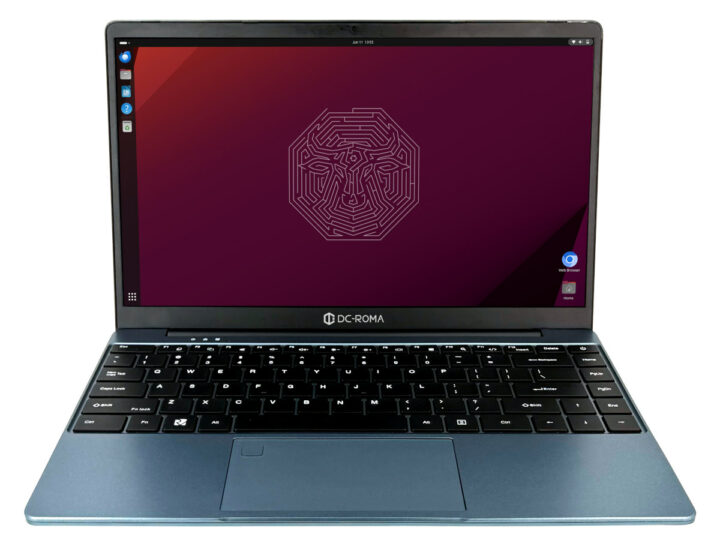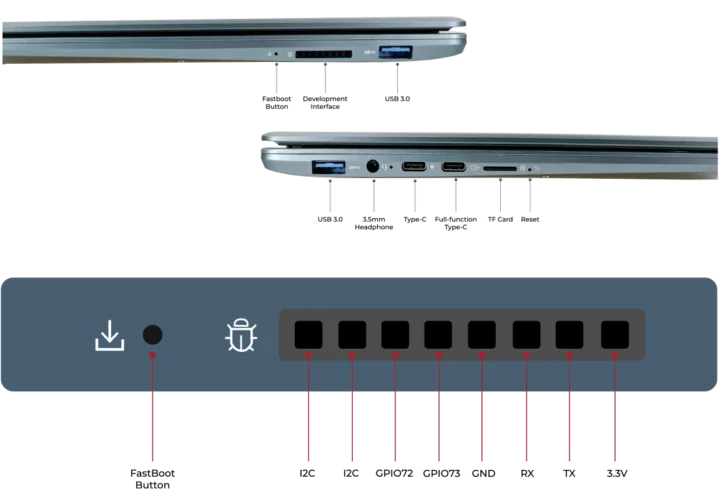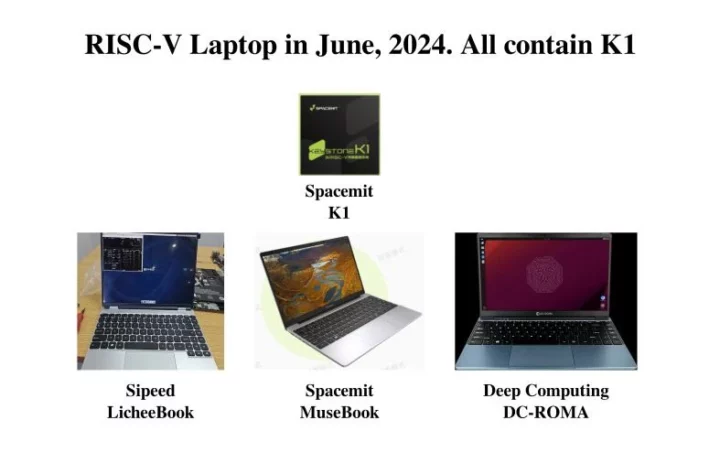Deep Computing has announced the DC-ROMA RISC-V Laptop II powered by a 2.0 GHz SpacemIT K1 octa-core 64-bit RISC-V processor coupled with up to 16GB DDR4 and running Ubuntu with official support from Canonical.
Deep Computing unveiled the first RISC-V laptop – named ROMA – in 2022 but it never really took off because of all the web3 and cryptocurrency features plus the ultra-high price. The new DC-ROMA RISC-V Laptop II does without those and features a 14-inch IPS display, a 1TB SSD, a WiFI 6 and Bluetooth 5.2 module, a webcam, several USB ports including a USB-C with DisplayPort Alr mode, and a “development interface” with a few GPIOs.
DC-ROMA RISC-V Laptop II specifications:
- SoC – SpacemiT K1
- CPU – 8-core X60 RISC-V processor @ up to 2.0 GHz; single-core performance equivalent to about 1.3x the performance of an Arm Cortex-A55
- GPU – Imagination IMG BXE-2-32 with support for OpenCL 3.0, OpenGL ES3.2, Vulkan 1.2
- VPU – H.265, H.264, VP9, VP8 4K encoding/encoding
- NPU – 2.0 TOPS AI accelerator
- RVA 22 Profile RVV 1.0 compliant
- System Memory – 8GB or 16GB LPDDR4x
- Storage – Up to 1TB SSD; microSD card slot
- Display – 14-inch IPS display with 1920×1080 resolution, 60Hz refresh rate
- Audio – 3.5mm headphone jack
- Camera – Full HD webcam
- Networking – Wi-Fi 6 & Bluetooth 5.2
- USB
- 2x USB 3.0 Type-A ports
- 1x USB 3.2 Gen 1 Type-C “full function” port with power, data, and DisplayPort Alt mode to connect another display
- 1x USB 3.2 Gen 1 Type-C port with power and data support
- User input – QWERTY keyboard and touchpad
- Expansion – 8-pin “development interface” with GPIO, UART, I2C, 3.3V, and GND
- Misc – Fastboot button, Reset button
- Battery – Good for up to 8 hours on a charge
- Power Supply – Via USB-C port
- Dimensions – 32.3 x 20.9 x 1.7cm
- Weight – 1.36 kg
That’s the exact same hardware design as the Muse Book laptop that Leo looked into details – including a teardown – a couple of months ago. The DC-ROMA II laptop is said to run an optimized version of Ubuntu 23.10 Desktop, which is odds since support for Ubuntu 23.10 will end in July 2024, or in other words: next month… Canonical will likely release Ubuntu 24.04 for the laptop soon. I’m unable to find additional technical documentation (including links to OS images), but a few more details may be found on the product page.
The DC-ROMA RISC-V Laptop II has a much better price than the first model with pre-orders starting at $399 with 8GB RAM and booting the OS from a microSD card. Adding a 1TB SSD adds $100 to the cost, and note that a power supply is not included by default. Two options are available:
- $50 Standard Dev ToolKit – 32G microSD card with Debian images, 32GB microSD card with Ubuntu Desktop images USB Type-C Cable, and Special Dev Cable to connect to the GPIO connector
- $100 Power Dev ToolKit – With everything in the Standard Dev Toolkit plus an 87W GaN 10000 mAH Charger Power Bank
The DC-DOMA laptop is not the only SpacemiIT K1 laptop in the works, as the aforementioned Muse Book laptop is up for pre-order on Arace Tech for $299 with 8GB RAM and a 64GB eMMC flash, and the Sipeed LicheeBook – that was initially planned with a TH1520 SoC, will also launch this month with the SpacemIT K1 octa-core RISC-V SoC according to a message on Sipeed Telegram channel.

Jean-Luc started CNX Software in 2010 as a part-time endeavor, before quitting his job as a software engineering manager, and starting to write daily news, and reviews full time later in 2011.
Support CNX Software! Donate via cryptocurrencies, become a Patron on Patreon, or purchase goods on Amazon or Aliexpress








Regarding the Ubuntu image.
My guess is that RISC-V hardware unfortunately still needs “tweeked” (technical term) software for some things… Drivers, accelerators… Idk.
I’m really looking forward to the moment when we can flash a standard image onto a RISC-V board. Maybe that’s when we’ll be able consider RISC-V to be consumer-class devices.
So SpacemiT designed the Muse Book .. and then Deep Computing rebadges it and bumps up the price?
Should the Canonical partnership be see as an endorsement of sorts? or it’s just a matter of throwing enough money at them?
The first ROMA laptop seemed like insane buzzword vaporware (it says online it was released.. but I don’t see a single review) that it’s really hard to trust this company
Imagination GPU… that’s not a good omen.
Lots of RISC-V systems have Imagination GPUs. Is something wrong with them?
Many people remember those manufacturer as a gpu that cant run with free Software. There was some news that there could be a change in the company orientation. But lets see if this really happens and how free they would be in the future.